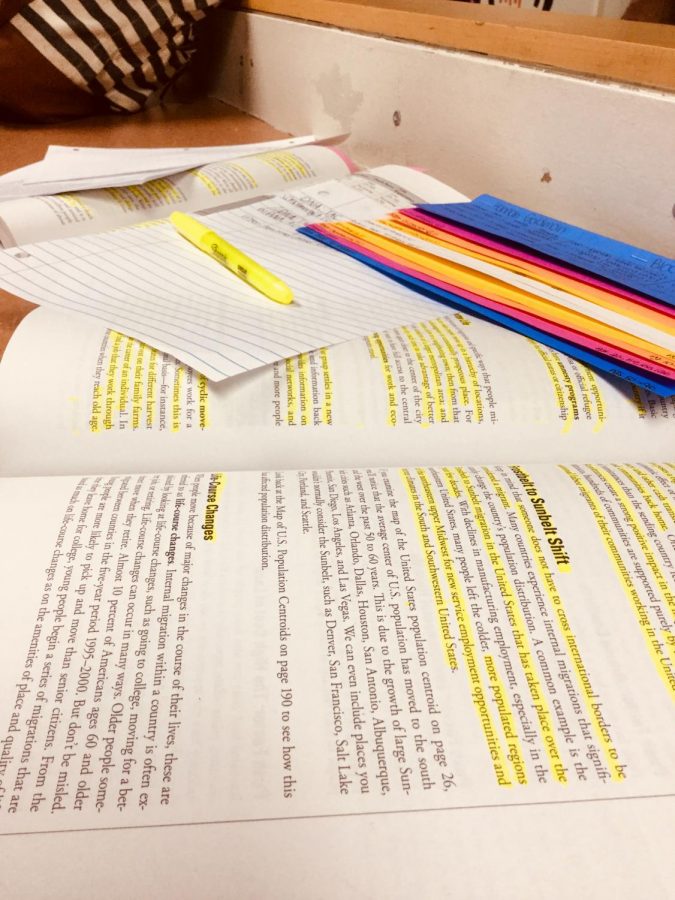Too Much Work Not Enough Time?
Staying up to 3 O’Clock to finish that homework assignment should never be the answer.
This is an example of how much work students ge each night.
May 17, 2018
When you have piles of work that look like mountains, it is hard to think that you will finish the hike to the other side, especially when you want to stay directly on the path. School work causes stress, mood changes, increased risk for mental disorders, and increases the risk for suicide.
To me, it seems insane that some people want to end their life because of a mountain of school work, the size of Mount Everest. Anna Barchetti Durisch wrote in Global Education Magazine, “Suicide causes are to be attributed to several psychological, biological and environmental factors. Strong correlation between low educational achievement, examination and school performance stress and between suicide has been investigated and confirmed.”
From personal experience, I have averaged seven hours of homework a night during the first semester of freshman year. For those students who have jobs, sports, extracurriculars, religious activities, chores, or any other time consuming activity, fitting in seven hours of work can be hard to do. In addition, up to 87% of students tend to procrastinate on school work.

Juliette Molina, a sixth grader at Erie Middle School, enjoys doing theater, but sometimes finds it hard to want to do her work. On average, Molina usually gets four worksheets for homework. This usually ends up taking up about fifteen minutes of her time. Molina believes that her homework is doable and generally easy.
“To be honest, my school should not cut back on work because I am not challenged enough and my homework is easy and takes a little bit of time,” Molina added.
Brendan Murphy, a freshman at Erie, recalled his days in middle school. “When I was in middle school I remember at least getting 45 minutes of work,” says Murphy.
Both Molina and Murphy excel in academics. The difference between homework from middle school to high school is large. Proving that, Erie Middle School has started to cut back on work.
If Erie Middle school has cut back on work over the past three years, then why has the high school has failed to do this?
Molina discovered that homework may be beneficial, but not a large amount of it. Duke University conducted 60 studies with the goal of trying to figure out if homework is beneficial for students. The studies proved that homework is beneficial. However, the studies also proved that getting homework in excessive amounts was not beneficial to students and was counterproductive.
It may feel as if it is physically impossible to hike across the mountain of homework. This could also impact physical health. When doing a lot of work, many people may not have the time to do physical activities and keep up their physical health. In health class, many students learned about the three most important aspects of a good mental health. There is the physical, mental, and social aspects to this belief. A person who lacks in one of these areas is said to have a poor mental health. When a student gets too many hours of work they start to lack in these areas. So why would schools be assigning all of this work even though it goes against what they teach their students?
Grady Wolver, who is a freshman at Erie High School, is enrolled in all honors and advanced placement (AP) courses, had a lot to say on the matter. “I mean, we go to school seven hours a day and are expected to learn and understand things when we are still sleep deprived from focusing and working on a lot of homework,” comments Wolver.
So many people have learned to hike their way across the mountain, but still may not be successful at this. Schools do need to learn how to cut on their work so students can focus on their mental and physical health.
It may be understandable for classes to assign homework, especially AP classes. Homework is healthy for students, just not excessive amounts of it.
Amy Norris has figured out how to get control on her homework, making her week less stressful, “I do all of my homework ahead of time or in study hall so that way I get less stressed later on.”
Norris recalls still getting stressed, but in lesser amounts than other students get.
However, Norris’s solution is not failproof. Next school year, she may not be given a study hall and struggle on getting ahead with her work.

When students get too many piles of work it affects both a mental and physical aspect of their life. Teenagers needs at least nine hours of sleep per night, however, most teens only end up getting seven hours of sleep a night. Some studies show that 60 to 70 percent of students are borderline sleep deprived.
Dr. Mary Carskadon is an expert on sleep. Carskadon is a professor of psychiatry at Brown University and is a director of sleep research at Bradley Hospital. From her personal experience in the field, Carskadon discussed the matter with childmind.org, and made the analogy is that sleep deprivation is similar to an a stigmatism. You never know how bad your vision is until you get glasses, or in this scenario a good amount of sleep.
Schools truly do need to cut back on work. The amount of homework they give is toxic. I believe the amount of work schools give is very hurtful for a students both physically and mentally. This is because it can cause sleep deprivation, stress, anxiety, and many other things that are harmful to a person.








































JD Whitlock • Sep 24, 2018 at 12:38 am
I’m currently taking a CCNA certification class at my community college, and working full time, and the course load is absolutely insane. I have exactly 4 hours after work and before class, which goes up until just before I need to be in bed to get 6 hours of sleep for work the next day, and despite racing home each day to pour those 4 hours into assignments each day, I still had 12 assignments due for that one class on Monday, as well as to study for 2 exams on that same monday, and 5 more assignments due 4 days later on Thursday and an exam on that day as well. I spent literally every waking moment of Friday, Saturday, and this Sunday pouring into homework and managed to get the 12 assignments done, but I haven’t been able to study for a moment for the two exams tomorrow, and I will probably fail them.
I did over 30 hours of homework on a weekend and over 50 hours of homework in total during this week. This is for a single certification class. This is absolutely ridiculous and terribly paced.
Delaney Spielman • May 20, 2018 at 1:17 pm
Hey Hannah, great job on this piece! You’re narration on the subject was both thouhhtful and informed. Good work!